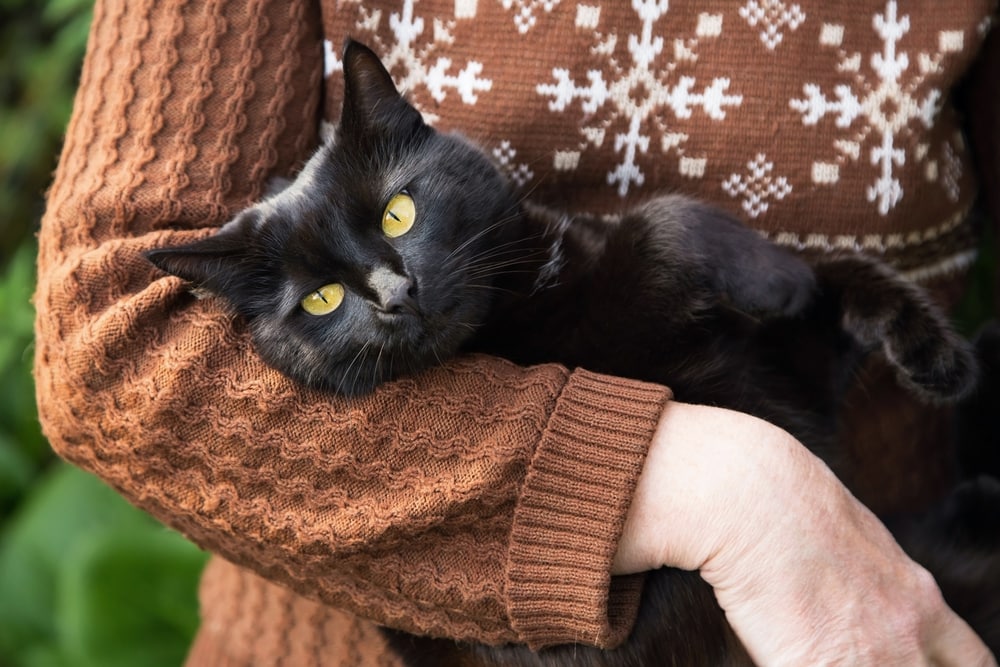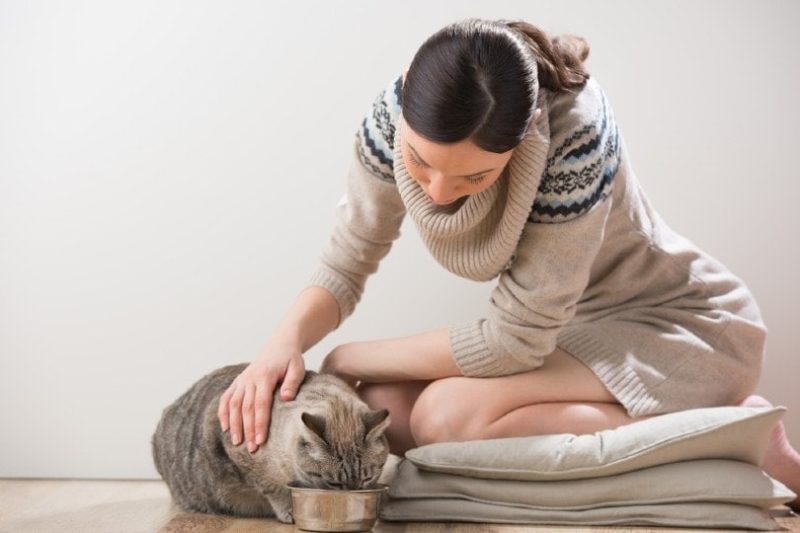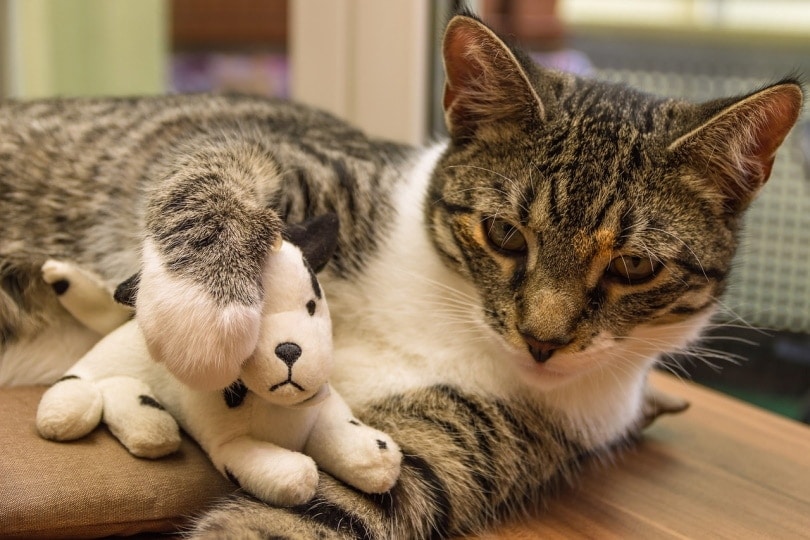At What Age Do Male Cats Start Spraying? Vet Approved Reproductive Info

Updated on
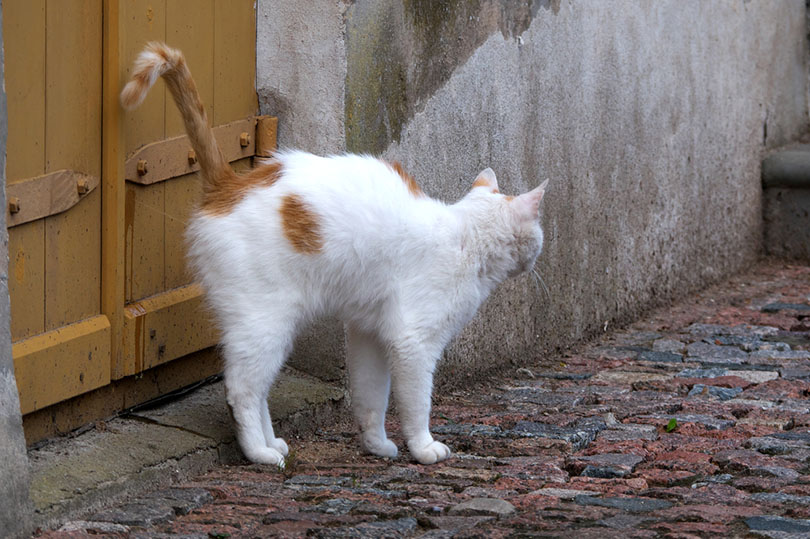
Even though spraying is something that both male and female cats can do, male cats are considerably more likely to participate in this behavior. Once you get a new male kitten, it’s important to prepare for spraying so that you can hopefully prevent it or reduce it.
In most cases, male cats start spraying when they are around 6 months old because this is when most cats reach sexual maturity. Some males can start spraying as early as 5 months or as late as 9 months, though.
Keep reading to learn more about male cat spraying behavior and what you can do about it.
When Do Male Cats Start Spraying?
The reason male cats do not start spraying until they reach sexual maturity is not because they need to develop their body first. Instead, it’s because the reason that cats spray is mainly due to marking territory or attracting a mate, both of which require sexual maturity.
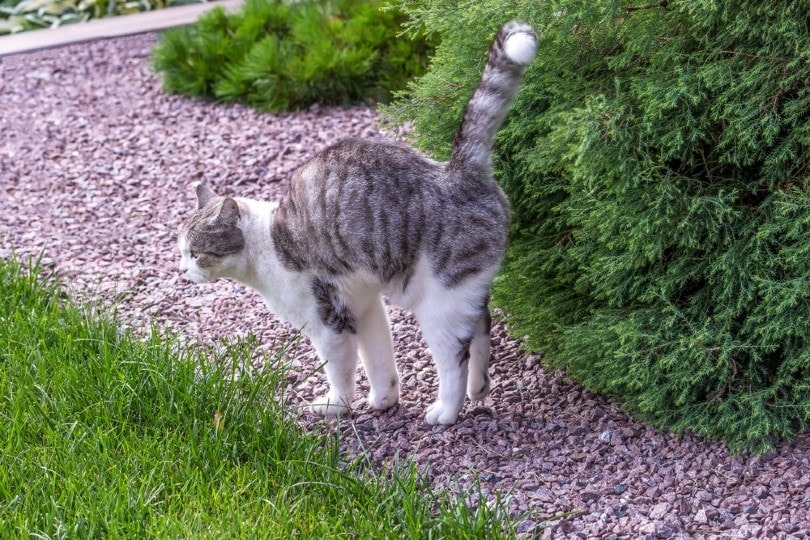
Why Do Cats Spray?
The reason male cats do not start spraying until they reach sexual maturity is not because they need to develop their body first. Instead, it’s because the reason that cats spray is mainly due to marking territory or attracting a mate, both of which require sexual maturity.
Mark Territory
In the wild, male cats often spray on certain items to mark their territory. Likewise, indoor cats will mark their territory on some of their favorite spots, such as pillows, curtains, and even you.
Spraying is an ideal way to mark their territory because their urine contains pheromones, which are chemically coded messages that relay information about the cat to other cats.
Marking territory is a sign of dominance, which is why male cats are more likely to spray than females. Even though females can act out of dominance, males are more likely to do so.
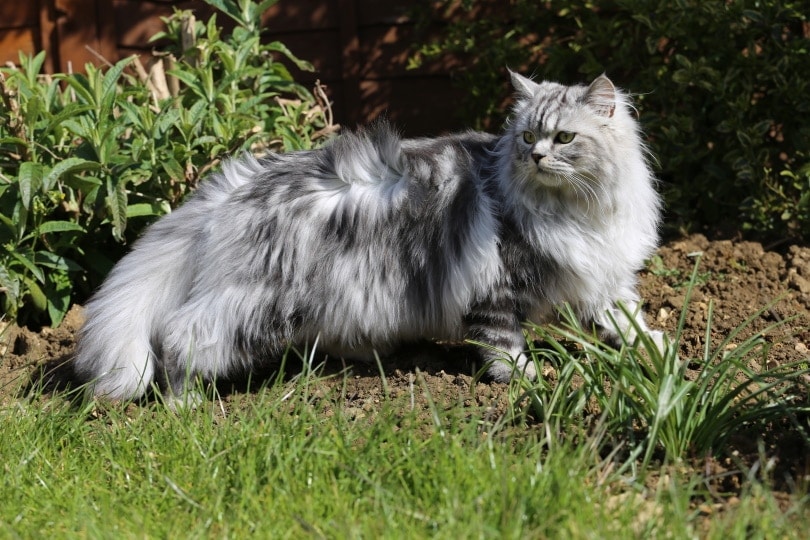
Attract a Mate
Male cats may spray to attract a mate when previous methods don’t work. Most male cats start the mating process by actively looking for females, following the scents and pheromones female cats leave, and by meowing and yelling constantly. When this doesn’t work, the male will spray to attract a female to his pheromones, using it as a means of communication.
You can tell that your cat is spraying for this reason if the spraying came after constant meowing and yowling. Male cats don’t act this way often, and typically only act this way when trying to attract a mate or during fighting with another cat. When inside on their own, the yelling will not produce a mate. So, the male will resort to spraying, which won’t attract a mate either.
Possible Health Issue
Sometimes cats may spray or leave puddles in unusual places in the home or urinate outside of their litter box if they have a urinary issue. This should always be checked out by your vet, as urinary blockage is a risk, particularly in male cats. However, this is more common with urination rather than spraying.
Any changes in the cat’s urination or spraying habits, excessive spraying in inappropriate places, straining to urinate without passing any urine, or passing small amounts or bloody urine are an indication for an urgent trip to the vet. Stress and anxiety caused by any changes in the cat’s daily routine or environment may also lead to spraying.
What Is the Difference Between Urinating and Spraying?
If you are concerned about your male cat spraying, it’s important to understand the difference between urinating and spraying. Because spraying is a release of urine, it can be a bit difficult to distinguish between the two if you have never seen it before.
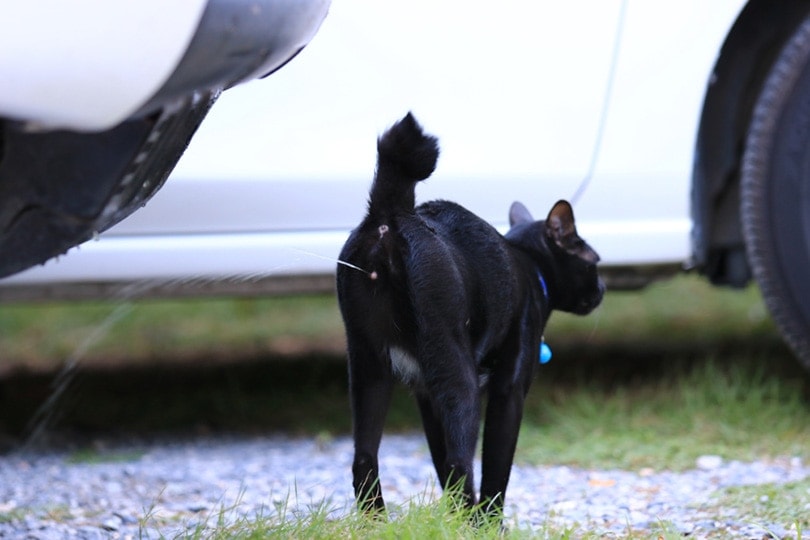
Spraying is distinctly different from urinating because of the posture the cat will be in. Whenever your male cat sprays, the tail will be erect, but it may shake or vibrate a bit. The cat’s rear end will be elevated too, and most cats have a weird look on their face before spraying.
The amount of urine released can also help you distinguish between normal urination and spraying. When spraying, cats only release a little bit of liquid in a jet-like stream.
 How to Prevent Your Male Cat From Spraying
How to Prevent Your Male Cat From Spraying
If your male cat has started spraying, there are a few things you can do to prevent the behavior.
Neuter
Most importantly, get your cat neutered if he is not already. Fixing a cat will stop the spraying in the majority of cases. So, your first option would be to neuter the cat because it is likely to prevent the issue. Plus, it helps to keep feral or homeless cat populations down and reduces the risk of your cat roaming, getting injured from fighting, being hit by a car when out searching for female cats, or contracting serious infectious diseases in the process.
If the problem persists after neutering, speak to your vet or a feline behaviorist. It’s also very important that your cat gets a thorough check at the vet’s office to ensure there is no medical or other underlying reason for them spraying, such as a urinary issue.
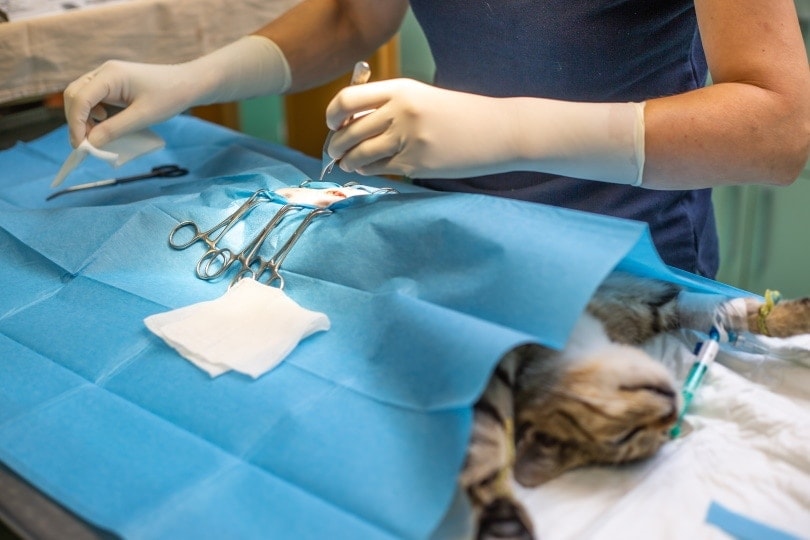
Identify Stressors and Eliminate Them
If your cat is neutered and is still spraying, the behavior is likely linked to stress. Cats can also spray if they are feeling stressed or threatened, either by the change in your household, such as new furniture or friends coming over, moving houses, or the presence of a new dog or cat in the neighborhood. It’s important to get down to the root cause of your cat spraying, particularly if this is related to stress. Eliminate stressors to prevent neutered cats from spraying.
To help make the process less stressful, make sure to provide enough food and resources for all cats in the home. This includes food bowls, water bowls, litter boxes, cat beds, and toys. Also, provide a safe space for the cat so that they can hide whenever stressed.
Try Pheromones
As mentioned above, pheromones are chemically coded messages that cats can understand. You can buy a pheromone product recommended by your vet to spray around your home or use a pheromone diffuser. The goal of pheromones is to relax your cat and hopefully prevent them from spraying. This won’t work in all cases, but some cats respond positively to it.
Clean Affected Areas With an Enzyme Cleaner
Any spot the cat has sprayed needs to be cleaned with an enzyme cleaner. For best results, use a cleaner multiple times on the same spot to fully remove the scent. By removing the scent, the cat is less likely to spray in the same spot again. You can also try placing the cat’s food in the area, as they are less likely to spray close to where they eat.
Our favorite enzyme cleaner is the Hepper Advanced Bio-Enzyme Pet Stain & Odor Eliminator Spray. It's our product, and we love it so much, we just have to share. It permanently removes the very worst smells and stains (yes, everything you can imagine!), and we offer a 100% satisfaction guarantee!
- ADVANCED ENZYMATIC CLEANER - Penetrates the most stubborn smells and stains at the deepest molecular...
- FOR ANY MESS, ON ANY SURFACE - This pet odor eliminator cleans your carpets, floors, furniture,...
Don’t Punish
Even though spraying should not be encouraged, it shouldn’t be punished either. By punishing your cat for spraying, you are damaging the bond you have, causing fear and negative emotions in your cat, as he won’t understand the punishment and is more likely to spray in the future because punishment leads to stress. Instead of punishing, use the above methods to discourage the behavior more gently after identifying the cause for it.
 When to See a Doctor
When to See a Doctor
Sometimes, male cats will spray for medical reasons. Before trying all of the methods above to realize your male cat is still spraying frequently and you don’t know why, play it safe and take him to see a vet. Especially if he is neutered, there is likely a medical condition behind the issue, and your vet can confirm and treat this.
What About Female Spraying?
Even though females are much less likely to spray, about 5% of spayed female cats will spray during their lifetime. All the above methods for preventing and treating your male cat from spraying apply to females too, as well as getting them checked out by a vet to ensure there isn’t a medical reason for spraying and identifying and eliminating stressors.
Final Thoughts
Spraying is one of the most annoying things your male cat can do, though females can spray too. From the time your male kitten is 5 or 6 months old, the spraying may begin. It’s important to act swiftly to discourage that behavior. Neutering is the best option, but there are other things you can do to prevent spraying as well, depending on the underlying cause. Speaking to your vet is the first thing to do.
Featured Image Credit: Igor Shoshin, Shutterstock


 How to Prevent Your Male Cat From Spraying
How to Prevent Your Male Cat From Spraying
